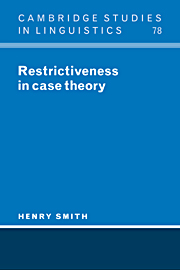4 - Linker interactions
Published online by Cambridge University Press: 04 November 2009
Summary
This chapter will be devoted to the interaction of various aspects of morphosyntax. First I will continue with some implications of the Elsewhere Pattern Prediction for linker interaction. The default is supposed to apply whenever nothing else can. The strongest evidence for the default status of any case is when its opportunities for application form as unnatural a class as possible. The choice is between, on the one hand, positing a very unlikely set of homophonous cases (or other linker type) which just happen to fill in all the gaps of the other linkers and, on the other, simply positing a default linker. The second type of interaction examined in this chapter will be between the valence-changing operations known as passive and antipassive and the linkers. The question is whether the system as it stands will predict the correct case even under circumstances of changed valence. Section 4.2 will show that a suppression view of the passive and the present theory of case interact to give exactly the right derived case frames. I will then extend the discussion, which has so far concentrated mostly on case (and to a limited degree on agreement), to linking by word-order position. I will present an analysis of a language that relies primarily on word-order position, English. Finally, it will be shown that the present system is equipped to handle the interaction of case and configuration in oblique and non-oblique contexts.
Other elsewhere patterns
The Elsewhere Pattern Prediction has further implications which I would like to turn to now. The nature of a default is that it applies in the complement of the places where anything else applies.
- Type
- Chapter
- Information
- Restrictiveness in Case Theory , pp. 130 - 170Publisher: Cambridge University PressPrint publication year: 1996



